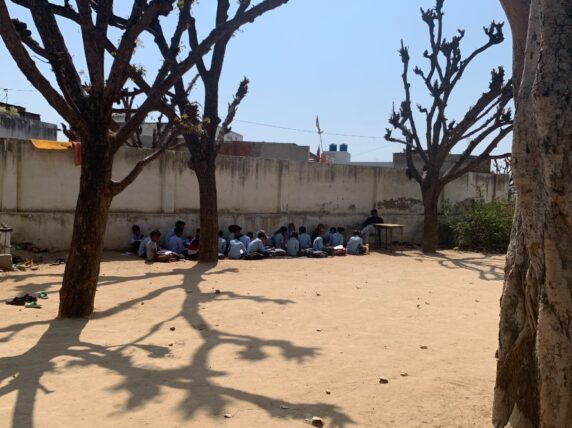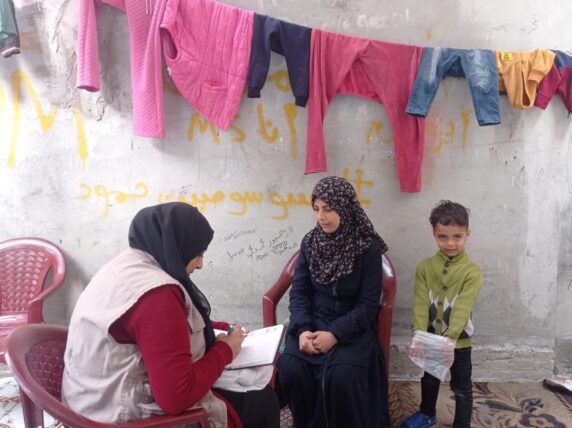5 ways the next UK government can strengthen its humanitarian assistance efforts
A staggering 362 million people, or one in 22 globally, now require humanitarian assistance.
As a result of man-made crises, in 2024, over 110 million people have been displaced from their homes, and more than 260 million face acute food insecurity, with some on the brink of famine.
In completing his tenure as the UN’s Humanitarian Affairs Chief, Martin Griffiths said: “I leave this job with a sense of work unfulfilled because the world is a worse place now than when I joined in 2021.” This poignant statement encapsulates the grim reality we face today: that none of us are immune to the impacts of humanitarian crises.
As the UK gears up for the general election on 4 July, the general public face a pivotal moment that will shape the country’s political, economic, and social landscape, as well as its foreign policy. Whomever forms the next government will have its work cut out in repairing its tarnished reputation on handling humanitarian challenges caused by conflicts. What concrete steps should the next British government take to effectively address the escalating humanitarian crises resulting from wars and environmental disasters?
1. Respond quicker and more effectively
The next UK government must be more responsive to global crises. The UK’s failure to heed warnings and prioritise atrocity prevention in Sudan is well evidenced. Despite repeated alerts from Sudanese and UK experts, the UK government placed their trust in “men with guns“.
This reluctance to acknowledge and understand the dynamics of mass atrocity violence is a glaring deficiency in British foreign policy. The lack of early-warning systems within the embassy and Foreign Office infrastructure hinders the rapid escalation of urgent matters to the ministerial level. The next government must urgently address these structural and intellectual shortcomings to prevent future catastrophes. It is unacceptable for a nation with the UK’s resources and influence to remain “cautiously optimistic” in the face of impending violence and human suffering.
2. Uphold International Humanitarian Law
The UK must consistently support international humanitarian law. The government’s selective application to justice, as evidenced by its varying stances on ICC arrest warrants for leaders from Russia, Sudan, Serbia, and Israel, reeks of hypocrisy and double standards. While the UK welcomed the ICC’s arrest warrants for Russian President Vladimir Putin, it has failed to support similar measures against Israeli leaders. This inconsistency risks alienating partner countries and undermining the UK’s credibility on the world stage.
The next government must stand firmly for justice and human rights, regardless of political alliances or policy preferences. It is time for the UK to lead by example and demonstrate its commitment to international law, even when it may be politically inconvenient.
3. Truly embrace locally led humanitarian responses
The next government must move beyond mere rhetoric when it comes to locally led humanitarian assistance. This should involve strengthening understanding of locally led as a bottom-up approach, actively prioritising the perspectives and needs of local communities. The UK must recognise that each village, town, and city has its own unique characteristics and requirements, and avoid treating entire countries as monolithic entities.
By adopting this nuanced approach, the government can more effectively address the specific needs of diverse populations. This requires a shift in mindset from viewing locally led through the lens of “global north advocates” to truly listening to and championing local voices. Only by understanding the needs of the smallest communities can we hope to build a more effective and inclusive humanitarian response
4. Increase funding and spend smarter
It’s not just about throwing money at problems, but how effectively we spend it. I’ve seen first hand how donor fatigue sets in when millions are spent without visible improvements, but slashing budgets isn’t the answer. The UK’s decision to cut humanitarian spending by 21% for 2023/2024, to levels not seen for more than a decade, is nothing short of alarming considering the need. In a world where crises are multiplying, we should not be tightening our purse strings.
The next UK government needs to do more than just increase spending – they need to spend smarter. Transparent, iron-clad policies dictating where every pound goes are needed to ensure humanitarian assistance reaches those who need it most. No more waste on excessive bureaucracy or lining the pockets of corrupt officials or fuelling conflicts. Every penny should work towards alleviating suffering and building peace. It’s time we treated UK humanitarian assistance like the critical lifeline it is, not just another budget line to be trimmed when times get tough.
5. Reimagining humanitarian responses for the future
Any future government must convene discussions on the future of humanitarian work to adapt to the shifting crises in the 21st century. The current humanitarian system is ill-equipped to handle the scale and severity of modern disasters, compounded by climate change, increasing fragility, conflict, and economic turmoil.
The World Humanitarian Summit, held nearly eight years ago, has failed to deliver transformative change, and progress towards decolonising aid. The next government should review the outcomes of the summit and organise another gathering that genuinely leads to leaving no one behind. This summit must acknowledge past mistakes, introduce fresh narratives based on current challenges, and chart a course for a more inclusive and effective humanitarian response. It is an opportunity for the UK to lead the charge in reimagining the humanitarian system, foster collaboration, and drive innovation to meet the needs of those most marginalised.
An opportunity for the UK
The next government must embrace its moral responsibilities and international commitments. By prioritising atrocity prevention, upholding international law, genuinely embracing locally led humanitarian responses, and, critically, reversing the short-sighted cuts to humanitarian funding, the UK can reclaim its position as a reliable partner.
The time for half-measures and empty rhetoric has long passed. The world needs more than just words – it needs decisive, respectful and compassionate action backed by robust funding and smart policies.
The UK has the resources, the influence, and the know-how to make a real difference. What we need now is the political will to do so. The world is watching and waiting. It’s time for Britain to step up.




